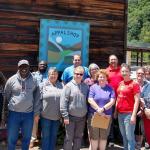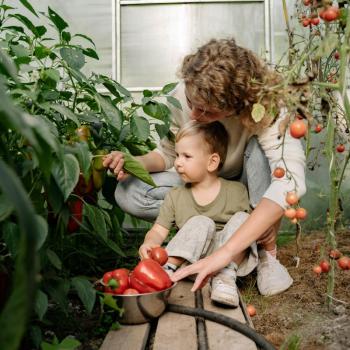Members of Lexington Theological Seminary’s Green Task Force gathered at Reed Valley Orchard near Paris, Kentucky, to volunteer with Glean Kentucky on Friday, Sept. 20. We picked up apples and pears that have fallen from the trees but are still in good condition. Our gleaning resulted in 777 pounds of fruit that will be distributed to ten different agencies this weekend, including backpack feeding programs at elementary schools and the YMCA.
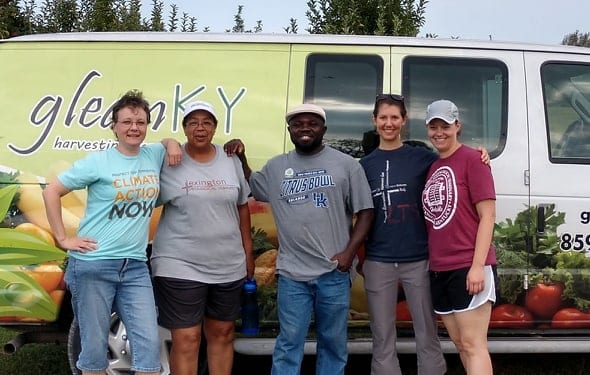
The word “glean” comes from the Celtic word glennare and it means to gather the leftover grain and fruits from the harvest.
Gleaning has a long biblical tradition.
In Hebrew, the word is In Leviticus, God commands the Israelites:
When you reap the harvest of your land, you shall not reap to the very edges of your field, or gather the gleanings of your harvest. You shall not strip your vineyard bare, or gather the fallen grapes of your vineyard; you shall leave them for the poor and the alien: I am the Lord your God. (Leviticus 19:9).
In other words, God considered it an injustice not to allow those without land or wealth – as well as immigrants and foreigners – to pick the useable leftovers in the fields and orchards. Gleaning was so important, that the command is repeated again in Leviticus 23:22.

Deuteronomy 24:21 specifies that the “alien, orphan, and widow” are to be permitted to glean the leftover grapes in the orchard. That is, immigrants, children, and women who suffer from poverty are to be treated with justice, allowing them to eat their fill of the harvest. No doubt among the people who will enjoy the fruit we picked today will be immigrants and refugees, children who would go hungry without these programs, and women who are grateful for fresh fruit to feed their families.
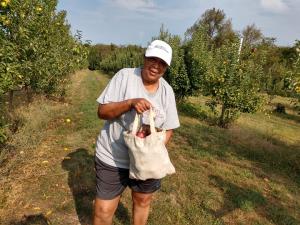
The most famous story of gleaning is found in the book of Ruth.
A widow and a foreigner in her mother-in-law’s country, Ruth offers to glean in the barley fields so that she and Naomi might have food to eat. A man named Boaz takes a fancy to her and makes sure she is protected while she gathers the leftover harvest. They eventually marry and their descendants result in the birth of Jesus many generations later.
Ruth was no slouch when it came to gleaning. She worked from dawn to dusk “without resting even a moment” (Ruth 2:7). She would have put me to shame. After just a few hours of stooping, kneeling, bending, picking, inspecting, and carrying bag-loads of fruit, I was done. Gleaning is not easy work. But when you do it with friends, a certain camaraderie develops. There’s time for conversation, getting acquainted with your fellow gleaners, deepening your relationships with friends and co-workers. It’s a community-building exercise.
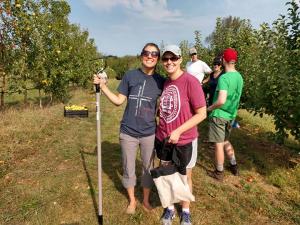
While we gleaned, others around the world took part in the Youth Climate Strike.
I wore my “Climate Action Now!” shirt in solidarity. A friend assured me that while we did not march, our work today is equally important. And it was not lost on me when our Glean guide mentioned that the harvest this year is down significantly from the previous year. Central Kentucky has endured many weeks without rain this summer. It seems we are either inundated with saturating rains that flood our fields, or shrivel from drought that parches us. Extremes like this are typical of the new climate era already upon us.
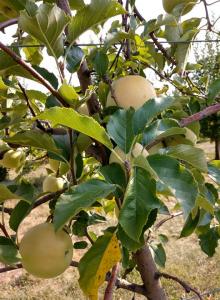
Yet we did the work. And we praised God for the abundance before us.
I like to think this is the way Jesus envisioned the kingdom where everybody eats. The orchard owners and their workers. The child who will bite into an apple this weekend. The bees that worked over the honeyed fruit decomposing in the sun. The deer and other animals that will pick their way among the droppings this evening. And me, when I bite into my fried pie filled with apples from the orchard – sweet and delicious.
No wonder apples are a symbol of what is treasured in the Bible.
Guard me as the apple of the eye;
hide me in the shadow of your wings. (Psalm 17:8)
Today we rejoiced in the apples and pears, the bright sun and the drifting clouds, the hands that pick and sort, and the mouths that will taste the sweetness of the Lord.

Leah D. Schade is the Assistant Professor of Preaching and Worship at Lexington Theological Seminary in Kentucky. She is the author of Preaching in the Purple Zone: Ministry in the Red-Blue Divide (Rowman & Littlefield, 2019) and Creation-Crisis Preaching: Ecology, Theology, and the Pulpit (Chalice Press, 2015).
Twitter: @LeahSchade
Facebook: https://www.facebook.com/LeahDSchade/
Read also:
The Climate Crisis is Coming and is Already Here. So is Jesus.
Healthy Trees, Healthy People: Why Citizen Scientists are Needed as Climate Changes


